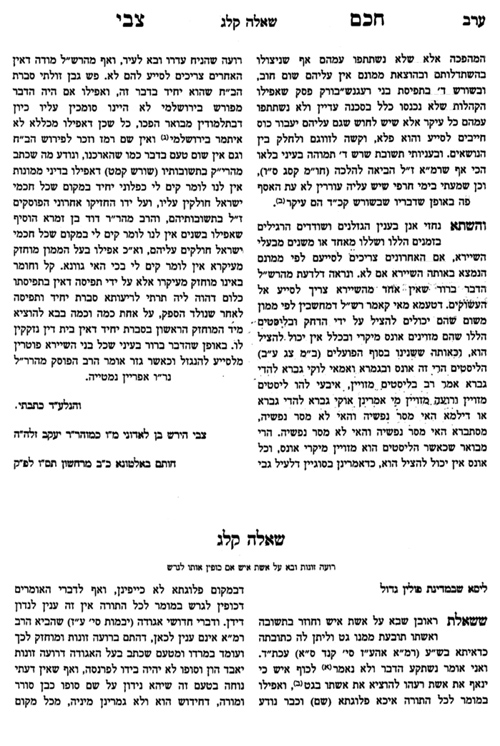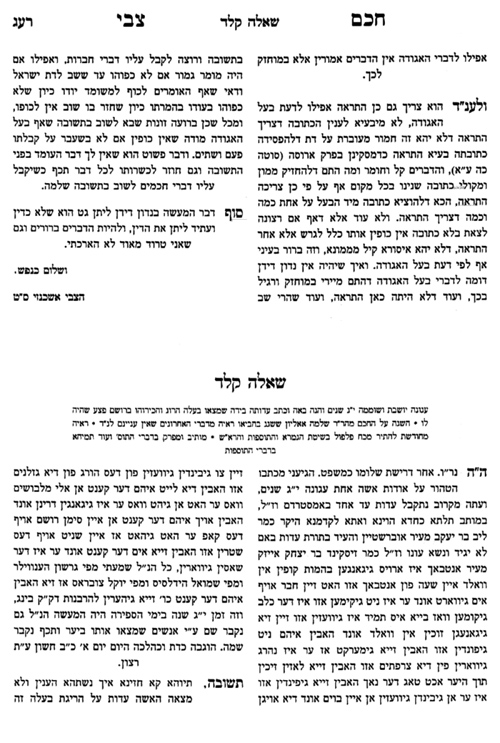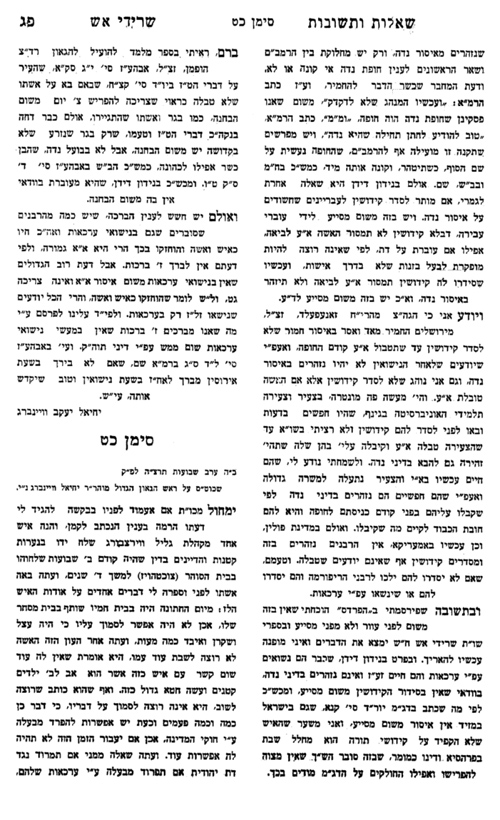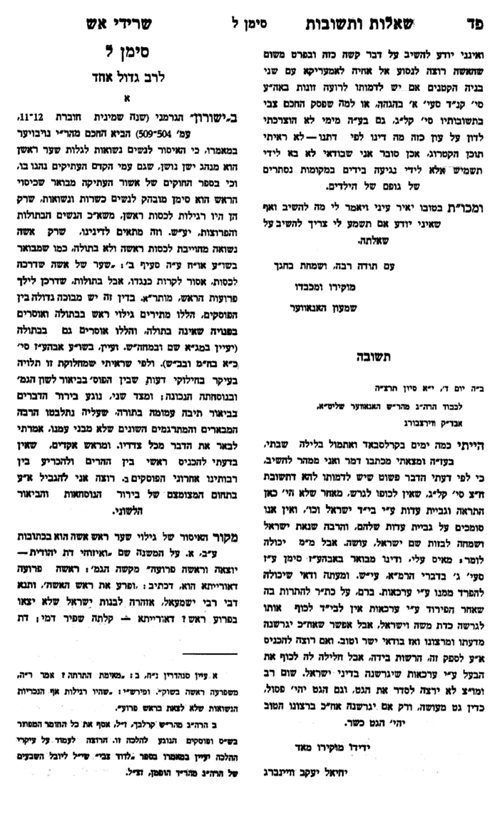The Agunah Problem, Part 1; Incarceration and Free Speech
The second approach is to find a problem in the marriage ceremony itself, meaning that the marriage never took place. For example, one can show that there were no proper witnesses to the marriage. Here again, one can disagree with particular rulings, but not with the basic approach.
I feel it is necessary to stress this since we can now better appreciate why certain rabbis have attempted to find solutions within Jewish law to the contemporary agunah problem. Many on the right don’t see why this is necessary and why batei din cannot just follow Jewish law as it has operated until now instead of looking for “solutions”. These people might not realize the difficult situation this puts women in, a situation that might have been tolerable years ago but for more and more Orthodox Jews that is no longer the case. On the other hand, many on the left think that it is a simple matter to solve the agunah problem, and that it is just cruel and insensitive rabbis preventing this. This too is a distortion as the rabbis’ hands are often tied by halakhah, and this remains the case no matter how much of a “rabbinic will” they have.
AGUNAH (pl: AGUNOT) A married woman who may not remarry because the death of her husband has not been verified or because (for whatever reason) she is unable to obtain a get from her husband.
ואלו שכופין אותו להוציא מוכה שחין ובעל פוליפוס והמקמץ והמצרף נחושת והבורסי בין שהיו עד שלא נישאו ובין משנישאו נולדו ועל כולן אמר רבי מאיר אע”פ שהתנה עמה יכולה היא שתאמר סבורה הייתי שאני יכולה לקבל ועכשיו איני יכולה לקבל.
The following are compelled to divorce [their wives]: A man who is afflicted with boils, or has a polypus, or gathers [objectionable matter] or is a coppersmith or a tanner, whether they were [in such conditions or positions] before they married or whether they arose after they had married and concerning all these R. Meir said: Although the man made a condition with her [that she acquiesces in his defects] she may nevertheless plead, “I thought I could endure him, but now I cannot endure him.”
This final reason given by Sefer Agudah is based on sevara and not on a rabbinic text.[17] I don’t know why it was not cited by the dayanim, but it supports the point I made that the beit din need not be bound by examples given in the Talmud or other rabbinic sources. Rather, it can evaluate the current psychology of women and how they regard marriage.
Now that we have seen some of the real halakhic difficulties that stand at the center of the so-called agunah problem, in the next post I will offer a simple suggestion that I think can solve at least some of the cases.
A symbolic imprisonment, which served as a means for expiation as well as one of humiliation and embarrassment, consisted of shackling a suspected murderer, for example, during a service. He was to have his hands as well as his body chained. This was apparently a tradition received from R. Judah the Pious.[30]
[26] For a detailed discussion regarding whether the beit din can force a wife beater to divorce his wife, see R. Isaac ben Walid, Va-Yomer Yitzhak, vol. 1, no. 135.









One thought on “The Agunah Problem, Part 1; Incarceration and Free Speech”
שמי שלי יחימוביץ ‘, מתל אביב (ישראלי). לאחר 12 שנות נישואים, בעלי ואני היינו באחד העשבים עד שהוא סוף סוף עזב אותי ועברנו לקליפורניה להיות עם אישה אחרת. הרגשתי שהחיים שלי נגמרו והילדים שלי חשבו שלעולם לא יראו את אביהם לעולם. ניסיתי להיות חזק רק בשביל הילדים אבל לא יכולתי לשלוט בכאב שמכות את ליבי, לבי התמלא עצב וכאב כי הייתי מאוהבת בבעלי באמת. כל יום ולילה אני חושב עליו ומאחל לו תמיד לחזור אלי, הייתי ממש נסער והייתי זקוק לעזרה, אז חיפשתי עזרה באינטרנט ונתקלתי באתר שהציע שד”ר אוסגידה יכול לעזור להחזיר פריטים במהירות. אז הרגשתי שאנסה אותו. יצרתי איתו קשר והוא אמר לי מה לעשות ועשיתי את זה ואז הוא עשה לי כישוף אהבה. 48 שעות אחר כך בעלי התקשר אלי באמת ואמר לי שהוא כל כך מתגעגע אליי והילדים, כל כך מדהים !! אז ככה הוא חזר באותו היום, עם הרבה אהבה ושמחה, והוא התנצל על הטעות שלו ועל הכאב שהוא גרם לי ולילדים. מאז אותו יום נישואינו היו חזקים מבעבר, הכל בזכות ד”ר אוסגיד. הוא כל כך עוצמתי והחלטתי לשתף את הסיפור שלי באינטרנט שד”ר אוסגיד גלגל כישוף אמיתי וחזק שתמיד אתפלל לחיות זמן רב כדי לעזור לילדיהם בזמן של צרה, אם אתם כאן ואתם זקוקים לאקס שלך חזרה או שבעלך עבר לאישה אחרת, אל תבכה עוד, צור קשר עם הכישוף החזק הזה עכשיו. הנה כתובת המייל שלו: doctorosagiede75@gmail.com או whatsapp ו- viber בטלפון +2349014523836